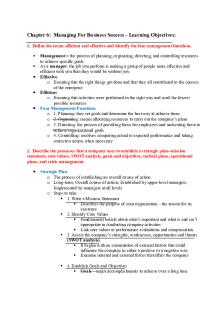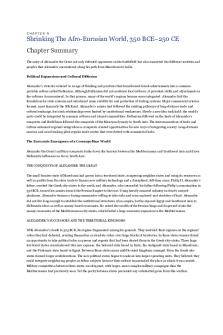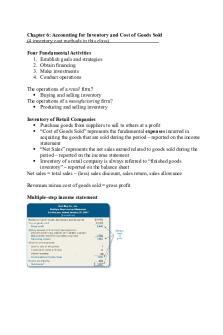Parental investment - Lecture notes 6 PDF

| Title | Parental investment - Lecture notes 6 |
|---|---|
| Author | Taslima Begum |
| Course | Social Psychology |
| Institution | Brunel University London |
| Pages | 4 |
| File Size | 258 KB |
| File Type | |
| Total Downloads | 10 |
| Total Views | 142 |
Summary
lecture notes on theory...
Description
Parental Investment Theory Robert Trivers -
-
-
Defined Parental Investment as “any investment in an offspring that increases the change of its survival at the expense of the parents ability to invest” According to the theory, most species males and females do not invest equally
Human females invest considerably more than males because females have the obligatory biological investment in their children. Males are not subjected to the same biological pressures. Females produce far few egg cells over the course of their lifetime and are far more costly to produce than males produce sperm. Therefore, females have a greater investment as they can only have a limited number of offspring. Male can potentially have a larger number of children. As a result of inequity, females are sexually discriminating in their choice of mate (Intersexual selection), unlike males who will compete with other males (Intrasexual selection) for access to the higher investing sex.
Postnatal Investment -
-
Females also make a larger postnatal investment as well as prenatal investment. In humans, childbirth occurs relatively early in development due to the large size of the human skull, which means that human infants are born more immature than most other animals. Therefore, females are burdened by the extended period of childcare that results from this period of prolonged immaturity, including breastfeeding and carrying. In addition, the cost of childcare is especially high. As a result, human mothers make a greater postnatal investment, thus resulting in a big difference in the maximum reproductive success of the sexes. Therefore random mating is more costly for human females.
Parental Certainty -
Parental certainty is a reason why females have greater maternal investment. Human reproduction is internal fertilisation, which means females are always certain that they are the mother of the child. Males other hand do not have the same degree of parental certainty that they are the biological father of the child. Males who do paternally invest, are under pressure to protect themselves from being cuckolded and investing in a child who is not genetically their own, and thus may be more unwilling to invest heavily in the child.
LINK
Sexual Infidelity -
-
The possibility of sexual infidelity poses different adaptive problems for males and females. For example: A man whose mate was unfaithful is at risk of investing in an offspring that is not genetically his own. A woman with an unfaithful mate is at risk of the diversion of resources away from her and her children. Therefore, sexual jealousy may have evolved as a solution to these problems, because men are more jealous of the sexual act itself to avoid cuckoldry, whilst women are more jealous of the shift in emotional focus and consequently loosing resources.
Strength Animal Study -
-
-
Human parental behaviour can be understood through comparative analysis between nonhuman species and humans for parental investment. Research has found that in both chimpanzees and bonobos – pygmy chimpanzees that are the two most closely related species to humans, found that males showed little or no parental investment. This suggests that the male parental investment is either an evolutionary change over our ancestors or the contribution of cultural learning.
Issues of extrapolation, animal findings cannot be generalised to humans.
Weakness
Rowe -
-
-
Psychologist Rowe suggested that view of the evolutionary perspective of parental invested as limited because there are various personal and social factors that can determine male’s parental behaviour. Evidence has shown that childhood experiences such as divorce tend to correlate with the degrees to which men invest in the care of their children. This includes the quality of the relationships with the mother and the personality characteristics of the father. In addition, there are individual differences, and other childhood experiences where there is a possibility of the male being traumatised or emotionally distressed from their own parent’s relationship. Therefore, males may over-compensate their own lack of parental investment, or be unwilling to invest.
Strength Baker and Bellis -
-
A consequence of sex differences in parental investment is extra-marital affairs. Baker and Bellis estimated that 14% of the population were products of extramarital affairs from a magazine survey of over 2700 UK women. This suggests that women may attempt to compensate their greater parental investment through cuckoldry. To achieve this, women would marry men who had good resources such as having a caring nature and can provide financial support, and achieve good genes from attractive men through extra-marital affairs. Therefore, the benefits a woman may receive by cuckolding their partners would be additional social support from and potentially higher quality genes for her children. However, there are risks such as abandonment and according to Daly and Wilson, the use of mate-retention strategies for example, violence by the current partner.
Weakness Anderson -
-
-
Research suggests that parental certainty is not always an issue for human males. The parental investment theory predicts that paternal investment would be greater if the father knew the child was biologically theirs, this is because a man would not want to invest resources in another man’s child. Research by Anderson contradicts this assumption, as Anderson measured the resources invested by fathers and step-fathers. The findings showed that men do not appear to discriminate between children born to their current partner from a previous relationship and their own children from a previous relationship. As a result, this research not only provides evidence that males do invest largely regardless to parental certainty, but also that the parental investment theory is bias, having prejudice against males simply because females have the obligatory biological investment.
-
Moreover, females do not necessarily have to provide postnatal investment, as some mothers may abandon their own offspring after birth.
-
The findings cannot be generalised as it only distinguishes between biological fathers and step-fathers who know they are either biologically the father or not. It does not identify whether fathers who have been cuckolded or suspect cuckoldry discriminate with resources.
-
Strength Buss -
In relation to the prediction of the Parental Investment theory, Buss et al found that males US students showed more distress when given scenarios of sexual infidelity. Female students showed more distress for emotional infidelity, thus supporting the view on sexual and emotional jealousy.
Weakness Harris -
However, Harris found that mend tended to respond with more arousal to any sexual imagery, which challenged this view that sex differences in jealous are an adaptive response in male s and females.
Strength Geher et al -
The physiological approach can be used to explain the differential costs of parental investment between males and females. Research by Geher et al found that males showed greater arousals of the Autonomic nervous system than females when presented with scenarios that showed the cost of parenting. This is consistent with the parental investment theory which predicts that males are biologically less prepared than females to deal with the issues associated with parenting....
Similar Free PDFs

Investment Banking - Lecture Notes
- 99 Pages

Investment Law Lecture Notes Outline
- 33 Pages

Lecture notes, lecture 6
- 3 Pages

6 - investment decision rules
- 9 Pages

Ch 6 - Lecture notes 6
- 3 Pages

Chapter 6 - Lecture notes 6
- 5 Pages

Module 6 - Lecture notes 6
- 2 Pages

Chapter 6 - Lecture notes 6
- 6 Pages

Chapter 6 - Lecture notes 6
- 9 Pages

Anth101 6 - Lecture notes 6
- 4 Pages
Popular Institutions
- Tinajero National High School - Annex
- Politeknik Caltex Riau
- Yokohama City University
- SGT University
- University of Al-Qadisiyah
- Divine Word College of Vigan
- Techniek College Rotterdam
- Universidade de Santiago
- Universiti Teknologi MARA Cawangan Johor Kampus Pasir Gudang
- Poltekkes Kemenkes Yogyakarta
- Baguio City National High School
- Colegio san marcos
- preparatoria uno
- Centro de Bachillerato Tecnológico Industrial y de Servicios No. 107
- Dalian Maritime University
- Quang Trung Secondary School
- Colegio Tecnológico en Informática
- Corporación Regional de Educación Superior
- Grupo CEDVA
- Dar Al Uloom University
- Centro de Estudios Preuniversitarios de la Universidad Nacional de Ingeniería
- 上智大学
- Aakash International School, Nuna Majara
- San Felipe Neri Catholic School
- Kang Chiao International School - New Taipei City
- Misamis Occidental National High School
- Institución Educativa Escuela Normal Juan Ladrilleros
- Kolehiyo ng Pantukan
- Batanes State College
- Instituto Continental
- Sekolah Menengah Kejuruan Kesehatan Kaltara (Tarakan)
- Colegio de La Inmaculada Concepcion - Cebu





